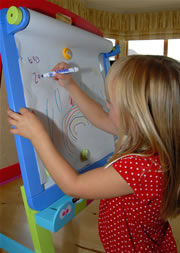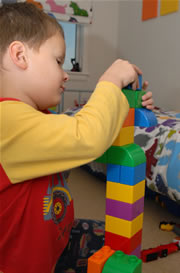motor skills
Developing Motor Skills - how to help your child with play and hand skills at around the 3 to 5 year level
 The information on this page is also available to download:
The information on this page is also available to download:
At this age children will have become quite independent and creative in their play. They are showing an interest in making, imagining and understanding things around them. Their hand skills are now well developed and they will be able to use tools like scissors, fork and knife, washcloth, hairbrush and toothbrush with increasing independence and skill. Play becomes linked to skills needed for successful achievement at school. Your child’s play has been helping them to develop their ability to attend, problem solve, create and socialise with their peers, which will be important as they enter their first school setting. Their play interests will determine what they enjoy and will want to do ‘for fun’ in the future.
Activities to develop construction and creativity are important and may include:
- Any drawing activities using things like wet sand and a stick, finger paint, fingers in shaving foam, drawing with paint
 dabbers, chalk or sponge brush with water on the pavement or a chalk board, as well as crayons, pencils and felt pens. Your child might like to copy shapes like circles, square or a cross. Once they can do this they may copy letters for their name and begin to draw recognisable pictures like a face and then a person with a body. This type of creating can occur in other ways too, such as playing with felt shapes, peel off or plastic sets that have body parts or familiar children’s characters.
dabbers, chalk or sponge brush with water on the pavement or a chalk board, as well as crayons, pencils and felt pens. Your child might like to copy shapes like circles, square or a cross. Once they can do this they may copy letters for their name and begin to draw recognisable pictures like a face and then a person with a body. This type of creating can occur in other ways too, such as playing with felt shapes, peel off or plastic sets that have body parts or familiar children’s characters.
 Construction with things like Play-Doh or biscuit dough using safe tools like a blunt knife, potato masher, garlic press, rolling pin, biscuit cutters. You can help your child make recognisable figures with dough, using kits that are available or something like Mr Potato Head pieces to help your child decide where the features should go. Other construction activities like junk modelling, building blocks, Duplo, Brio and Stickle Bricks will all help develop imagination and building skills. Don’t forget to encourage messy construction too with paper, scissors, glue and interesting things like shells, dried pasta shapes, leaves and magazine pictures.
Construction with things like Play-Doh or biscuit dough using safe tools like a blunt knife, potato masher, garlic press, rolling pin, biscuit cutters. You can help your child make recognisable figures with dough, using kits that are available or something like Mr Potato Head pieces to help your child decide where the features should go. Other construction activities like junk modelling, building blocks, Duplo, Brio and Stickle Bricks will all help develop imagination and building skills. Don’t forget to encourage messy construction too with paper, scissors, glue and interesting things like shells, dried pasta shapes, leaves and magazine pictures.
- Pretend play is important and is especially fun to do so with peers now. This type of play may now become quite complicated with invented people and objects. Children might copy characters seen on TV or in books and may enjoy dressing up in play clothes like a doctor or princess as well as old grown up clothes. Encourage pretend play with Wendy House and shops, dressing up, small figures, animals and vehicles in play settings. Other dolls like Action Man with clothes and accessories, pretend food and tools.
- Books and music are becoming more meaningful and more complicated books will be appreciated, perhaps with flaps to lift and longer stories. Listening to and making music will develop your child's sense of rhythm and timing for movement skills. All these activities help develop important communication skills and can help teach social skills and life skills for example ‘this is the way we (wash our face) song’ reinforces self-care skills.
- Puzzles and toys can now become more complicated such as jigsaw puzzles with more parts. Toys and games can now have smaller features or pieces that further develop their hand skills and hand eye co-ordination.
- Board games and more organised movement activities will become a favourite pastime and will involve more co-operative play with peers. Games like Dominoes, Snakes and Ladders and Ludo develop hand eye co-ordination as well as teach sharing, turn taking and develop positive competition skills with peers and family. Movement games like Skittles, ball games, Simon Says will also develop these skills as well as strength and co-ordination.
